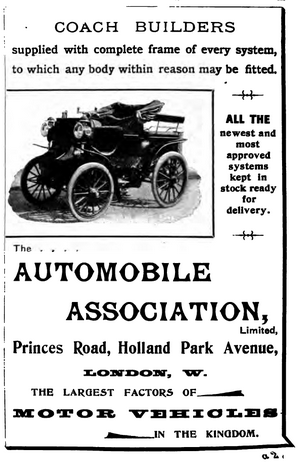















Automobile Association |
|---|
|
| External Links |
|---|
|
Official Site: TheAA.com
Wikipedia: AA plc |
| Page Sections |
|
History
Images Article Index |
History
The following section is an excerpt from Wikipedia's AA plc page on 16 July 2020, text available via the Creative Commons Attribution-ShareAlike 3.0 Unported License.
AA plc, trading as The AA (formerly The Automobile Association), is a British motoring association founded in 1905, which currently provides vehicle insurance, driving lessons, breakdown cover, loans, motoring advice, road maps and other services. The association demutualised in 1999, to become a private limited company, and in 2002, the AA Motoring Trust was created to continue its public interest and road safety activities.
The Automobile Association was founded in 1905, to help motorists avoid police speed traps, in response to the Motor Car Act 1903 which introduced new penalties for breaking the speed limit, for reckless driving with fines, endorsements and the possibility of jail for speeding and other driving offences. The act also required drivers to hold a driving licence (which was obtained without a test on payment of five shillings) and to display a registration plate on their vehicle.
By 1906, the AA had erected thousands of roadside danger and warning signs, and managed road signage until responsibility was passed to local authorities in the early 1930s. By 1926, the organisation had installed 6,500 direction signs, and 15,000 village signs, most of which were removed during the Second World War. In 1908, the organisation published its first AA Members' Special Handbook containing a list of nationwide agents and repairers. AA patrols on bicycles warned motorists of police speed traps ahead.
In 1910, in a legal test case (Betts vs. Stevens) involving an AA patrolman and a potentially speeding motorist, the Chief Justice, Lord Alverston, ruled that where a patrolman signals to a speeding driver to slow down and thereby avoid a speed trap, then that person would have committed the offence of 'obstructing an officer in the course of his duty' under the Prevention of Crimes Amendment Act 1885. Subsequently, the organisation developed a coded warning system, used until the 1960s, whereby a patrolman would salute the driver of a passing car which showed a visible AA Badge unless there was a speed trap nearby, on the understanding that their officers could not be prosecuted for failing to salute. The AA Handbook stated that "It cannot be too strongly emphasised that when a patrol fails to salute, the member should stop and ask the reason why, as it is certain that the patrol has something of importance to communicate."
In 1910, the organisation introduced AA Routes and in 1912, began inspecting hotels and restaurants, issuing AA Star Classification to those deemed to be of sufficient quality and introduced pre purchase and post accident repair checks in the 1920s. In 1920, members were issued with keys to roadside wooden telephone boxes which could be used to call the organisation for assistance (the boxes began to be erected in 1912 as shelters for watchmen or patrolmen). There were almost 1,000 boxes in their heyday, and they remained in use until the 1960s.
After the war, the AA led protests against petrol rationing, which was repealed in 1950. 1949 saw the launch of a night time breakdown and recovery service, initially in London only, then extended nationally. The AA Insurance brokerage service was started in 1967. The organisation campaigned for the compulsory wearing of seat belts, and for the introduction of unleaded petrol. Seat belt legislation became law in the United Kingdom in 1983 as required by the Transport Act 1981. They have lobbied successive governments over what they describe as 'unfair motoring taxes'.
In February 1972, the AA relocated from its central London offices to Basingstoke. It began broadcasting AA Roadwatch traffic reports on commercial radio stations the following year. AA Relay was also introduced in 1973, a service that will deliver a broken down vehicle, its driver and passengers, luggage and trailer to anywhere in Britain.
The association demutualised in July 1999 to become a private limited company, which was bought later the same year by Centrica (best known for its British Gas and Scottish Gas brands). Centrica sold the AA in July 2004 to two private equity firms, CVC and Permira, who in July 2007 merged the AA with Saga under Acromas Holdings.
 |
Subject: Automobile Association Advertisement
Source: The Automotor and Horseless Vehicle Pocket Book (1899) View image of Automobile Association 1899 Advertisement - 189KB |
| Date | Article | Author/Source |
|---|---|---|
| 15 March 2002 | "Roads to Nowhere" says New Zealand AA | NZ Automobile Association |
